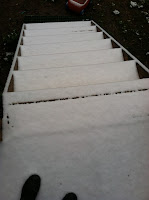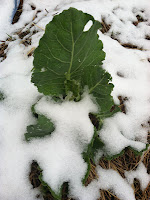
A few weeks ago, we went to Owls' Knob for the first time in months. My husband had gone out the weekend before to knock back the initial cobwebs and work on getting the lights and water working. It is a constant battle to maintain a house in the woods. Nature is always trying to reclaim the homesteads that speckle its wilderness.
Personally, I have been reclaiming and establishing my own values, trying to find balance and peace in my life. I live on a street inside city limits now. We have a big back yard and an abandoned wooded lot beside our house and lots of parks to explore; nevertheless, we are NOT living in the country. And my boys are NOT being raised as "country boys." This bothers me.
I admire country boys. I married a country boy. The simplicity, community, and the closeness to the earth of country folk is to be envied. However, the city contains a wide world of conveniences, distractions, and opportunities. The city has a lot to offer in its culture, activities, and open minded acceptance. So I straddle my life between the city and the country. Internally I battle, heart against mind, over where we should live and how we should raise these boys. I have not figured it out yet and if you get it all figured out, please share!
 |
| That look in his eyes... wonder, reverence? |
Regardless, one virtue stands true. I want my boys to love nature. I do not care if they grow up to live in New York City or in the wilderness of the Ozarks. If they grow up to be rich or poor, gay or straight, ambitious or relaxed, I will be proud of them just the same. But I want them to have reverence for the earth with the same passion that a Christian wants her boys to know Jesus. The earth is our home, our mother, and if my boys do not respect her, I have failed.
So you might be thinking why on earth we do not live in the country, close to the earth, if this is so important? Well, I do not believe that would necessarily bring forth the desired love I am seeking. A hard life struggling, alone, in the middle of no where is not always fun for a child. If my boys have a hard childhood, like so many country folks do, they might run away and never look back. I've seen it before. Therefore, I continue to cautiously juggle this balance between nature and convenience. Because we are living in a world of technology, progression, and luxury. If I deprive my boys of such temptations they will only make them want it more.
 |
| I see love in that smile. |
This past weekend my boy, Zane, made me proud. He got dirty, he tromped through the weeds, and the peed on a tree. We went on hikes, tracked animals, and discovered both beauty and freaking awesomeness! But most importantly, Zane befriended a millipede. His grandfather found it and brought it to him. My four year old son carried the arthropod around for an hour. He let it walk from one hand to the other. His gentleness was remarkable. I could tell that he truly cared for his little friend.
Now before you cringe and scream gross, understand that the triumph here. I read a quote by Bradley Millar once, "Teaching a child not to step on a caterpillar is as valuable to the child as it is to the caterpillar." There is an important lesson in the quote. Now I must admit, caterpillars can devastate a garden and I have been know to slaughter them. However, the common caterpillar is to be admired because it will become a beautiful butterfly and I have tried to teach Zane not to step on bug. I also have tried to teach him to not stomp on beetles (even if they crunch satisfyingly) or spiders (but of course never touch a spider either). Many boys have a warrior instinct and a desire to protect at an early age. In tribes of our primal ancestors, boys (and girls too) hunted and therefore killed. I think for most boys, it is totally natural for them to want to stomp on insects. (I am not trying to get in an argument about gender roles here and I recognize that the stereotype does not hold true for everyone by any means. I'm just trying to say it is natural for them to do this. It is not an example of violent behavior.) So since Zane was very little I have been teaching him to be gentle and kind to all of earth creatures, even if they are a little creepy!
After a while, Zane wanted to make sure that the millipede went home to be with his or her "mommy and daddy." So we searched for a proper place for the millipede to live. A simple pile of leaves or log would not do, even when I told him that was the creature's preferred home. My son wanted his little friend to have a special place.
 |
| He is trying to count the legs! |
First we found, as my son called it, a nest. It was a beautiful rock that sat on the border of the iris garden. I was a rock my mother had collected from a river bed and it had a deep indention in it. The indention was full of rich dirt, luscious moss, and crystals. We put the millipede in this little home and Zane proceeded to make a roof even though I told him that the little guy didn't need or want a roof. When the millipede walked out of the designated home three times, Zane decided that it was not good enough and we would have to look further.
We finally found our way to the other side of the yard where a huge oak tree had once stood. I had spend my childhood swinging from a swing that had hung from that old oak tree. But the tree had died and because it dared to fall on the house, we had cut it down. We cut the trunk into boards that we intend to use for Zane's bedroom and the stump was turned into a thrown. Zane sat and stood on the thrown with this millipede for a long time. At one point he was hugging and kissing the arthropod with great affection. I told him that was weird. He didn't seemed to care. So I ignored his behavior, knowing that making light of it would only make his act more extravagant.
Soon after I walked away, Zane came up to me holding out his hands. "Nothing is in my hands," he explained.
"Where is your millipede?" I asked
He pointed to the thrown. "Over there." His voice sounded worried. Like the millipede had scurried off and left him alone.
"Oh that is a perfect home for your little friend! It has lots of rich dirt, decomposing leaves, and some good chunks of wood to hide under. Tell him goodbye and you might get to see him again. He will be your neighbor." It took some convincing but eventually Zane accepted the millipede's new home.
It wasn't that I wanted my boys to grow up to love millipedes particularly. I don't absolutely adore them, but if I was to choose a creature it is a heck of a lot better than a spider, right? It is slower than most animals so it was easy to catch and its hard shell let me relax and know that if Zane's gentleness slipped up the animal would survive. No, it was not about the millipede at all. The millipede was simply an embodiment of the earth. It personified nature and put the Ozark wilderness into the palm of my son's hand. I beam with pride knowing that my son cared for much for it. I just hope he always keeps such reverence for all of nature close to his heart.
 |
Zane is hugging the millipede,
while sitting on the back of the thrown |









.jpg)


























+637.jpg)






